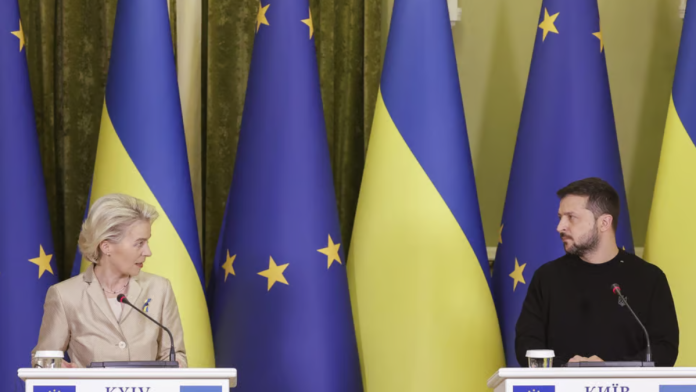A controversial new law signed by Ukrainian President Volodymyr Zelensky is drawing sharp criticism from both domestic and international observers. The law, passed on July 22, gives sweeping powers to Ukraine’s Prosecutor General over the country’s leading anti-corruption agencies. These changes have alarmed the European Union, with Commission President Ursula von der Leyen personally reaching out to Zelensky to express “strong concerns” and demand clarification.
The law impacts the National Anti-Corruption Bureau (NABU) and the Specialized Anti-Corruption Prosecutor’s Office (SAPO) — both created to operate free from political interference. Critics say the move threatens to undo years of hard-won progress in Ukraine’s fight against corruption.
EU Demands Clarity Over Law Threatening Reforms
According to European Commission spokesperson Guillaume Mercier, von der Leyen directly contacted President Zelensky regarding the law’s impact. The Commission reminded Ukraine that upholding the rule of law is a core requirement for joining the European Union. “There cannot be a compromise,” Mercier said, underscoring how essential independent anti-corruption institutions are for Ukraine’s EU path.
Under the new law, the Prosecutor General can now overrule decisions and block investigations carried out by NABU and SAPO. These two bodies were previously designed to operate without outside interference, especially from political offices. Many worry that the change reclassifies them as regular law enforcement agencies, stripping them of the autonomy needed to investigate powerful officials.
⚠️ Democracy in danger? Ukrainians flood streets as parliament cripples anti-corruption defenses
The EU’s concern goes beyond legal language. It is about the trust placed in Ukraine as a candidate country, and the fear that this law might allow corruption cases to be quietly dropped or manipulated.
Global Leaders Join in Condemning the Move
Reactions from other European governments have also been strong. German lawmaker Johann Wadephul warned that weakening anti-corruption efforts could directly impact Ukraine’s hopes of joining the EU. “Limiting the independence of Ukraine’s anti-corruption agency hampers Ukraine’s way towards the EU,” he posted on X (formerly Twitter).
Czech Foreign Minister Jan Lipavsky said his government is keeping a close watch on the situation. He reminded Ukraine that international backing is based on conditions — and one of the main ones is a real fight against corruption.
In a similar message, Sweden’s Foreign Ministry stated its “serious concerns”, noting that Ukraine has achieved noticeable progress over the past decade. “Staying the course is essential,” the ministry wrote, urging Ukraine not to abandon its reform path.
On July 23, EU Ambassador to Ukraine Katarina Mathernova met with Ukrainian Prime Minister Yuliia Svyrydenko and Deputy Prime Minister Taras Kachka. In her public comments, Mathernova said a new law is being prepared to reestablish and clarify the independence of NABU and SAPO. She said the effectiveness of these agencies is key to Ukraine’s EU aspirations.
NATO ramps up weapons flow to Ukraine as Trump warns Russia — Kremlin says it’s not afraid
Protests Erupt as Ukraine Defends Its Position
While international pressure grows, Ukrainians have also taken to the streets. Protests erupted shortly after the law was signed. Demonstrators are calling for the legislation to be repealed, arguing that it could allow corruption to flourish once again. Many fear the country is stepping back from reforms that took years to build.
Civil society groups and opposition lawmakers have echoed these concerns. They argue that the law threatens the very foundation of Ukraine’s anti-graft system. By giving the Prosecutor General more control, they say investigations into high-level corruption can now be blocked or delayed.
In response to the growing backlash, Ukrainian officials held a meeting with ambassadors from the Group of Seven (G7) on July 23. Following the meeting, Prime Minister Yuliia Svyrydenko stated in a Facebook post that Ukraine remains committed to fighting corruption. She added that this commitment would be reflected in the government’s next program of action.
Despite these reassurances, critics continue to warn that the new law poses a real danger to Ukraine’s progress and international partnerships. They say the strength of NABU and SAPO is not just a legal issue — it’s a symbol of Ukraine’s desire to move forward, not backward.


